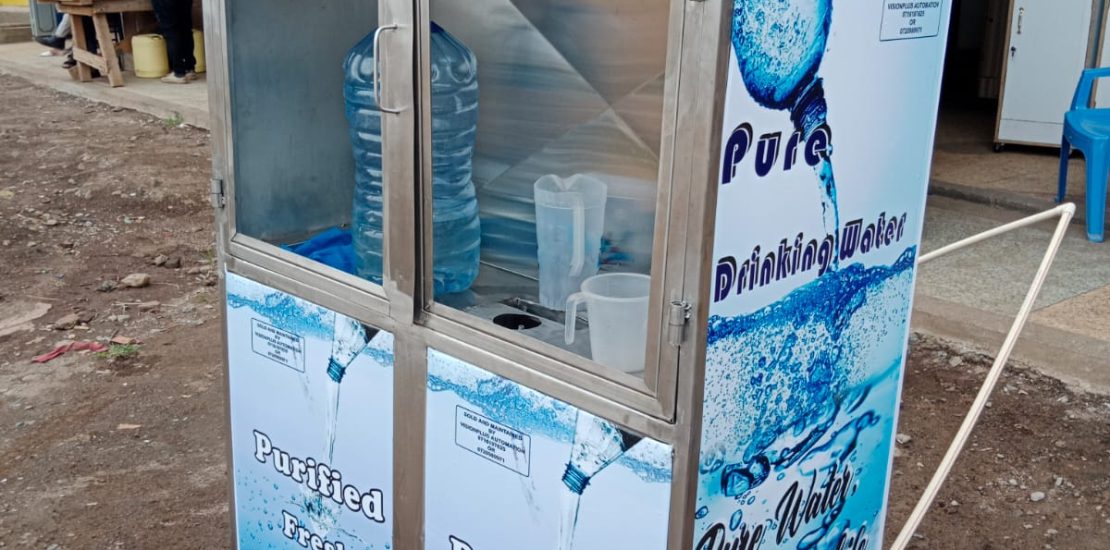- November 27, 2023
- Posted by: VisionPlus Automation
- Category: water vending business

Profiting from the Water Vending Business in Kenya
Profiting from the Water Vending Business in Kenya
Introduction
In Kenya, where access to clean and safe water is a vital concern, the water vending business has emerged as not only a solution to this fundamental need but also a lucrative avenue for entrepreneurs. This essay explores the strategies and considerations for generating profit from a water vending business in Kenya, emphasizing the economic potential and societal impact of this venture.
1. Strategic Location Selection:
The profitability of a water vending business in Kenya is closely tied to the strategic placement of vending machines. Identifying high-traffic areas such as markets, residential neighborhoods, and commercial centers ensures a consistent demand for clean water. Locations near schools, offices, and transportation hubs present opportunities for a steady stream of customers.
2. Pricing Strategies:
Effective pricing strategies play a crucial role in the profitability of a water vending business. The pricing should be competitive and reflective of the local market conditions. Consider offering discounts for bulk purchases or loyalty programs to encourage customer retention. Balancing affordability with profitability is essential for sustained success.
3. Quality Assurance:
Ensuring the quality of the water dispensed is paramount for the reputation and profitability of the business. Invest in robust water purification systems and adhere to health and safety standards. Regular water quality testing and certification can instill confidence in customers, encouraging repeat business and positive word-of-mouth marketing.
4. Technology Integration:
Embrace technology to enhance the efficiency and profitability of the water vending business. Implement digital payment systems to accommodate cashless transactions, making the purchasing process more convenient for customers. Additionally, consider incorporating smart monitoring systems to track machine performance, monitor water levels, and identify potential issues proactively.
5. Operational Efficiency:
Optimizing operational efficiency is key to maximizing profits. Regular maintenance of vending machines, timely restocking of water, and efficient route planning for machine servicing contribute to seamless operations. Streamlining processes reduces downtime, ensures customer satisfaction, and allows for the scalability of the business.
6. Branding and Marketing:
Invest in branding and marketing initiatives to create awareness and build a strong brand identity. Develop a visually appealing logo and signage for the vending machines. Utilize various marketing channels, including social media, local advertising, and partnerships with local businesses, to reach a broader audience and drive customer engagement.
7. Diversification of Products and Services:
Explore opportunities for diversification within the water vending business. Consider offering additional products or services, such as flavored water, water-related accessories, or water delivery services. Diversification not only expands revenue streams but also increases customer engagement and loyalty.
8. Community Engagement:
Building a positive relationship with the community contributes to the success of a water vending business. Engage with local residents, attend community events, and support local initiatives. A socially responsible approach can enhance the business’s reputation, fostering customer trust and loyalty.
9. Environmental Sustainability:
Incorporate environmentally sustainable practices into the business model. Encourage customers to use refillable containers and implement recycling initiatives for single-use packaging. Demonstrating a commitment to environmental responsibility not only aligns with global sustainability goals but also resonates positively with socially conscious consumers.
10. Monitoring and Adaptation:
Regularly monitor business performance, customer feedback, and market trends. Be adaptable to changing circumstances and consumer preferences. The ability to identify opportunities for improvement and innovation ensures the sustained relevance and profitability of the water vending business.
Conclusion:
Profitably operating a water vending business in Kenya requires a holistic approach that considers strategic location selection, competitive pricing, quality assurance, technology integration, operational efficiency, branding, diversification, community engagement, and environmental sustainability. As entrepreneurs tap into the growing demand for clean water, they not only create a profitable venture but also contribute to addressing a critical societal need. The water vending business in Kenya, when approached with a blend of business acumen and social responsibility, becomes a fountain of success, quenching the thirst for both profit and societal well-being.
